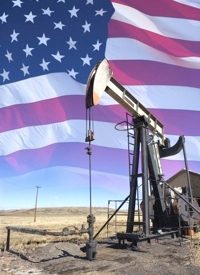
America at the end of WWII produced 60 percent of all the petroleum in the world. In fact, its status as the chief exporter of oil (the United States produced much more than the consumer and war economies needed) was a salient factor in the American victory. Interestingly, at one point the nation produced so much oil and gas that natural gas was “flared” or burned away because it was not economical to transport it. Once, in the lifetime of many Americans, filling stations engaged in “price wars” and sold gas at or near cost to consumers.
Abundant energy has been vital to American prosperity. Coal mines a short train ride from Pittsburgh and iron transported by freighters out of Duluth to ports on Lake Erie made Pittsburgh into the most efficient producer of high quality steel in the world, although other cities such as Birmingham and Bethlehem competed against Pittsburgh.
The steel of Pittsburgh was close to the factories of Detroit, which manufactured automobiles and trucks — and later, warplanes and tanks. Between those two metropolises lay Ohio cities such as Akron, Youngstown, Dayton, and Canton, largely built around the making of tires and glass. The marvelous engine of America industry, which dwarfed the rest of the world, grew not from government plans or subsidies, but rather out of the genius of Americans exercising the blessing of liberty. Freedom was what made our nation affluent and largely self-sufficient.
Have we drained the “natural wealth” of America dry? Hardly. Continental Resources CEO Harold Hamm sees the big picture of American wealth. As head of the 14th-largest oil company in the nation, he knows how much fossil fuel America possesses. He observes that if America had the right energy policies, it could be "completely energy independent by the end of the decade. We can become the Saudi Arabia of oil and gas in the 21st century. President Obama is riding the wrong horse on energy.” Hamm adds that so-called “green energy,” despite billions in taxpayer subsidies, will not work.
Hamm comes from Oklahoma, a large oil-producing state whose city of Tulsa is called around the globe the “oil capitol of the world.” But the ocean of oil that Hamm is referring to is in North Dakota and Montana — the “Bakken oil fields.” Production from these fields has already helped move America into third place among oil producers in the world.
The estimates about the amount of oil in these fields differ. A few years ago, the U.S. Geological Survey reported that Bakken has between four and five billion barrels of oil. Hamm thinks this estimate is extremely conservative: “No way. We estimate that the entire filed, fully developed, in Bakken is 24 billion barrels.”
Oil has risen well over $100 a barrel, although with full production of Bakken it can be expected that the price of oil will drop. But even if the price plummets to $60 a barrel, the value of this oil field could easily be $1.5 trillion. That would also double our nation’s proven reserves of oil.
Moreover, Hamm sees that the proven reserves of oil and gas, mostly in North Dakota, have risen just this summer from 118 billion barrels of oil and gas to 421 barrels. Hamm says it “is almost twice as big as the oil reserve in Prudoe Bay, Alaska. We expect our reserves and production to triple over the next five years,” adding that the middle class, not the wealthy, are the principal beneficiaries of the royalty payments: “There are ten million royalty owners across this country. The wealth is being widely shared.”
Hamm explains why, rather suddenly, America has risen again to the status of a major oil producer. “For nearly 50 years in this country nobody looked for oil here and drilling was in steady decline. Every time the domestic industry picked itself up, the Saudis would open the taps and drown us with cheap oil. They had unlimited production capacity and company after company would go bust.” But today, Hamm says, the Saudis can no longer dictate the price of oil. “Finally we have an opportunity to go out and explore for oil and drill without fear of price collapse.” Once America imported two-thirds of its oil, and now we import less than 40 percent, with most of that coming from our neighbors Mexico and Canada. Hamm thinks that North America could easily achieve energy independence in the next few years.
He also notes that drilling techniques have progressed so that we can now drill two miles underground and then spread out using “horizontal drilling.” Natural gas production has been dramatically enhanced by the use of hydraulic fracturing, or "fracking." Both techniques have opened up oil and gas that either was unreachable or could not be produced economically.
Hamm grew up as the son of rural Oklahoma sharecroppers, the youngest of 13 children. Through hard work, risk-taking, and an unbreakable spirit of enterprise, Hamm, who never went to college, has become the 33rd richest man in America. He has only one real gripe these days: Washington.
The White House invited him to a “giving summit” at which the rich were asked to give half their wealth to charities. Harold Hamm is hardly a miser, having given tens of millions of dollars to Oklahoma State University and also for diabetes research. He tried to persuade President Obama of the untapped wealth of our nation: “I told him of the revolution in the oil and gas industry and how we have the capacity to produce enough oil to enable America to replace OPEC. I wanted to make sure he knows about this.”
The President’s reaction disappointed Hamm: “He turned to me and said, ‘Oil and gas will be important for the next few years. But we need to go on to green and alternative energy." Even if you believed that, why would you want to stop oil and gas development? It was pretty disappointing.”
Hamm also believes that the whole issue of the national debt and federal deficits — which does capture Obama’s attention, at least rhetorically — can be dramatically improved by the exploration and production of oil and gas on federal lands. “I truly believe that if the federal government would allow more drilling permits for oil and gas on federal lands and federal waters, the federal government could over time raise $18 trillion dollars in royalties,” Hamm comments. That is more than the entire national debt.
Instead of encouraging Hamm to produce large numbers of good jobs for Americans, he says Washington keeps “sticking a regulatory boot at our necks and then turn[ing] around and ask[king], ‘Why aren’t you creating more jobs?’” Obama’s tax proposals also discourage production and exploration. Hamm notes that under the President Carter’s “windfall profits tax,” the count of active rigs in America dropped from 4,500 to 55 in a matter of months.” He says that North Dakota, the state in which most drilling is now taking place, has the lowest unemployment in the nation — a fact which should interest a President who claims to have jobs as his highest priority.
The life of Harold Hamm is a Horatio Alger story: A poor child in rural Oklahoma who never went to college has made himself rich through hard work, has shared his wealth, and could potentially make his country almost energy independent, produce vast federal revenues, and reduce unemployment — if only the federal government will get out of the way and let him.



